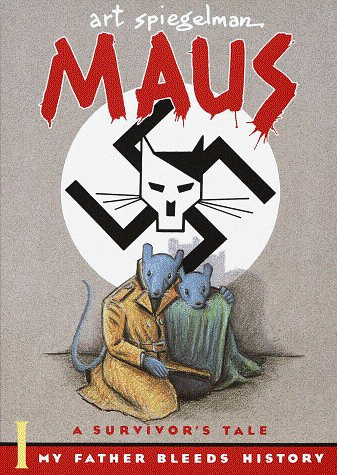Maus and
Maus II
by Art Spiegelman
Maus is one of the most unusual stories you will ever
read. It is the true story of a Holocaust survivor, Vladek, as
told by Art Spiegelman, his son. Just these facts should entice most
readers to pick up Maus - Holocaust stories are often rich with
courage, inspiration, and sacrifice. But Spiegelman goes further.
Spiegelman dares to tell the story in a
comic book. He also portrays all of the characters as
animals. Jews are mice, Germans are cats, Americans are dogs, and
so on.
Apart from the comic book format and the animal characters, another special aspect of the book
is how the story unfolds in flashbacks. Much of the dialogue takes
place between the author and his father around the kitchen or dinner
room table. Then the reader is continuously transported along Vladek's perilous
journey that eventually leads to Auschwitz.
As we picture Vladek telling us his story, Spiegalman weaves yet another
tale - that of the strained relationship between him and his
father. Vladek is in fact two different characters
throughout the books. During the Holocaust he is a courageous
and inspiring presence. Afterwards he is the author's intolerable,
widowed father living in retirement.
So in no small part Maus is Spiegelman's search for the many
influences in his life - an overbearing father, a writer's struggle to
tell a story, and the death of his mother when he was a teenager, among
many other things.
Spiegelman brings many of these elements together just as he is wrapping up the first
book. He recounts the unfortunate discovery that Vladek had destroyed his
late wife's diaries - a
discovery crucial to the writing of Maus.
Spiegelman: Christ! You save tons of worthless shit and
you ...
Vladek: Yes, it's a shame! For years they were laying
there and nobody looked in.
Spiegelman: Did you ever read any of them? Do you
remember what she wrote?
Vladek: No, I looked in but I don't remember...only I know
that she said, "I wish my son, when he grows up, he will be
interested in this."
Spiegelman: God damn you! You - you murderer! How
the hell could you do such a thing!!
Like any true life, Maus is multifaceted. Of course, a
great part of it is gripping because of the incredible circumstances and
choices that every Holocaust victim experienced. The metaphor of
the cats and dogs is subtle and tricky at the same time. And there
are - as in any life - moments of good humor.
One such moment is when the generation gap is closed, if only for a brief moment, when Vladek
admits his hopes for Spiegleman's work in progress.
Vladek: Someday you'll be famous, like...what's-his-name?
Spiegelman: Huh? "Famous like
what's-his-name?!"
Vladek: You know...the big-shot cartoonist...
Spiegelman: What cartoonist could you know...Walt Disney?
Vladek: Yah! Walt Disney...(as Spiegelman walks
away) Wait! Where do you go,
Artie?
Spiegelman: To get a pencil...I just gotta write this
conversation down, before I forget it!
Every page of Maus reveals countless extraordinary lives
touched by the Holocaust. In reviewing the two books, I ran across
stories that awed me yet again eight years after first reading them.
In telling such a special story, Spiegelman's Maus was recognized as
one of the best books in 1992, winning a special Pulitzer Prize that
year. So make it the first comic you have read in years. Once you read Maus, you will understand what a uniquely
powerful story it tells.
 ideas and events.com
ideas and events.com
